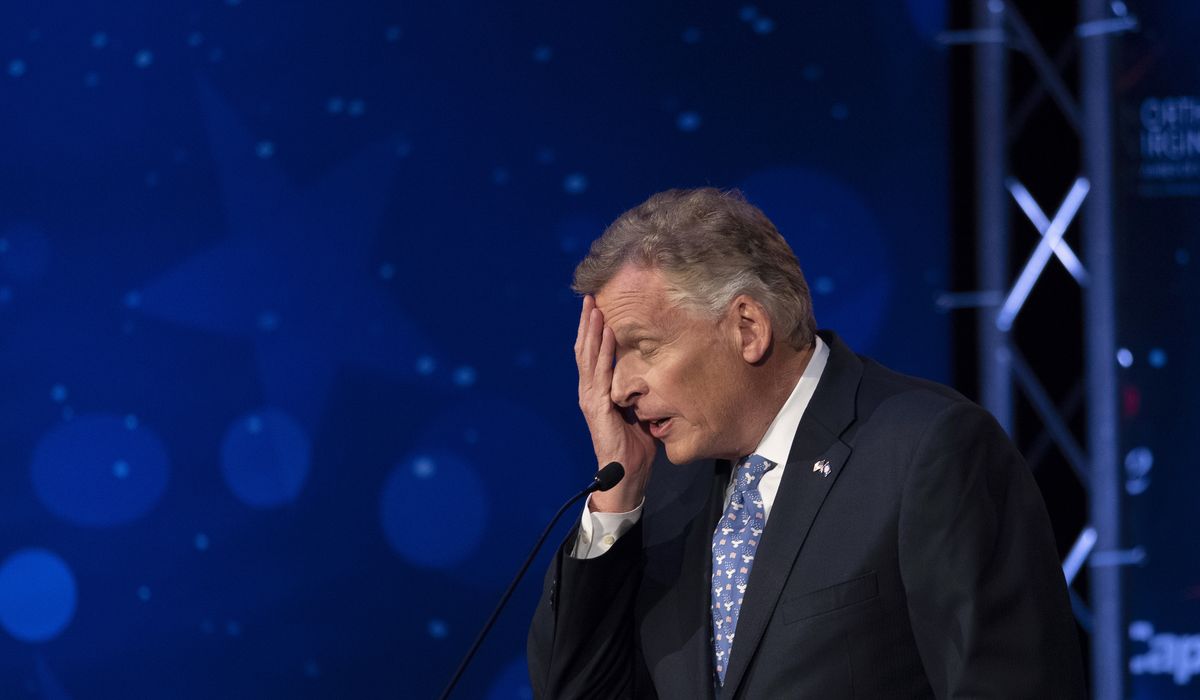
Former Gov. Terry McAuliffe is running for a return to Virginia’s top job, but an analysis of his record shows he has exaggerated some of his accomplishments from four years ago.
The Democrat fell short on his spending on schools and has flipped positions on issues such as right-to-work laws, according to fact-checkers and an analysis by The Washington Times.
Mr. McAuliffe, who served as governor from 2014 to 2018, has painted himself as an experienced leader in his campaign, touting his record of putting money into schools and handling the state budget in a fiscally responsible way.
“When I took office, I inherited an economy that was in chaos. I got to work. I got out of bed every single day fighting for you. I worked in a bipartisan manner. And guess what? We created 120,000 new jobs. Personal income went up 14%,” Mr. McAuliffe said Tuesday at the final gubernatorial debate against Republican nominee Glenn Youngkin.
In this campaign, his signature promise is a $2 billion investment per year in education, doubling the amount he put into schools when he was in office.
However, Mr. McAuliffe’s claims on record spending came up short by not accounting for inflation.
“In raw dollars, McAuliffe did sign budgets during his last two years that set state records for overall education spending and per-student outlays. But, this is misleading. A meaningful comparison of historic spending levels requires that the figures be adjusted for inflation,” according to PolitiFact, an independent fact-checker operated by the Poynter Institute in St. Petersburg, Florida.
Mr. McAuliffe also made blunders by saying he inherited one of the historically worst deficits because of Republican leadership.
“I inherited the largest budget deficit in the history of the state from Republicans,” Mr. McAuliffe tweeted in June.
The former governor has repeated that line since he launched his second campaign in December.
However, the $2.4 billion shortfall he inherited from Gov. Robert F. McDonnell was not the largest in state history.
In reality, Mr. McDonnell inherited a larger deficit when he succeeded Gov. Tim Kaine, now a U.S. senator, in 2010 in the aftermath of the Great Recession.
Virginia faced a shortfall of nearly $4.5 billion for the two-year budget set to start on July 1, 2010.
Mr. McDonnell also proposed a balanced budget as required by state law.
Justin Kirkland, a political science professor at the University of Virginia, told The Washington Times that Mr. McAuliffe’s political history puts him at a disadvantage because his opponents can put him under greater scrutiny while labeling him as a career politician.
“It’s easier to find things to use against him because he served in office for a really long time,” Mr. Kirkland said. “It’s a lot easier for Republicans or the Youngkin campaign to paint him as a kind of a career politician.”
The Youngkin campaign attacked Mr. McAuliffe for having an “extreme and dangerous” record after Tuesday’s debate.
“Terry McAuliffe was a disaster for Virginia and only offers recycled, failed policies for the challenges we face now,” a campaign email read. “Giving Terry a second chance means our children will suffer, our economy will stay stalled, the cost of living will continue to skyrocket, and Virginians will be less safe.”
In the debate, Mr. Youngkin hit at Mr. McAuliffe for his ambiguity on issues. He zeroed in on where the Democrat stands on right-to-work legislation.
Virginia law bans “closed shops,” which require workers to join a job site’s union or at least pay dues. Labor unions, a key part of the national Democratic coalition, vigorously oppose such laws and pressure Democratic candidates in the 28 states that have them for repeal.
Mr. Youngkin accused his opponent of trying to hide his views on wanting to eliminate right-to-work legislation.
Mr. McAuliffe supported right-to-work laws during his first campaign nearly a decade ago, but he recently said he would sign legislation repealing such laws. He added, though, that the General Assembly probably wouldn’t pass such a bill.
Bob Holsworth, a Virginia political analyst, said Mr. McAuliffe’s shift on certain positions resulted from a broader change among members of his party.
“It is an issue that McAuliffe has shifted on,” Mr. Holsworth said. “At least his argument now is, ‘Hey, listen, it’s not going to be my priority. And it’s not going to happen.’”
Mr. Holsworth said Mr. McAuliffe’s record at large serves him well as a pro-business Democrat despite certain shortfalls that have been pitted against him.
“Overall, McAuliffe was perceived as a pretty good governor who promoted the state well, though some of his big-ticket items on guns or health care were stymied by the fact that Republicans in the legislature didn’t approve of it,” Mr. Holworth said.
Democrats hold majorities in the Virginia House and Senate, though the legislature also is on the Nov. 3 ballot.
The McAuliffe campaign did not respond to a request for comment for this report.
Polls generally give Mr. McAuliffe a slim lead over Mr. Youngkin about a month before Election Day, though some surveys have Mr. Youngkin slightly ahead.
A Monmouth University poll released Monday had Mr. McAuliffe 5 percentage points ahead of his opponent with 48% support versus Mr. Youngkin’s 43%.
The Monmouth poll was conducted from Sept. 22-26 and surveyed a random sample of 801 Virginia voters. It has an error margin of 3.5 percentage points.








